Siamak Namazi’s Furlough Extended For Another Three Days
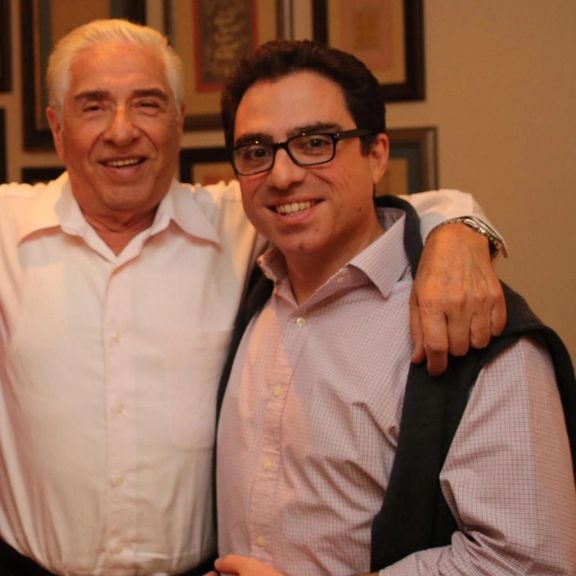
The furlough of Iranian-American citizen Siamak Namazi, who is held hostage in Iran over espionage charges, has been extended for another three days.

The furlough of Iranian-American citizen Siamak Namazi, who is held hostage in Iran over espionage charges, has been extended for another three days.
Babak Namazi, Siamak's brother, made the announcement in a statement on Saturday, expressing hope that his brother's 10-day leave will lead to his permanent release from prison.
Namazi has spent seven years in jail on trumped-up espionage charges. His father, who went to Iran to free him in 2016, was also arrested and accused of espionage.
Last week, Bagher (Baquer) Namazi, Siamak’s father, finally left Iran after 6.5 years of detention, and Siamak was let out of prison for a furlough. The United States that has been demanding freedom for four citizens held Iran said that Namazi’s release was not part of deal.
Tehran has it will receive $7 billion of its frozen funds for a prisoner exchange deal with the United States, but it did not specifically claim that the money is related to the Namazis.
The United States said last week that reports from Iranian sources of a transfer of funds related to the release of Bagher and the furlough for his son are categorically false.
United Nations spokesperson Stephane Dujarric announced about Namazis in a statement on Saturday, October 1, but the Islamic Republic periodically announces that release of its frozen funds is imminent to prop up its currency.
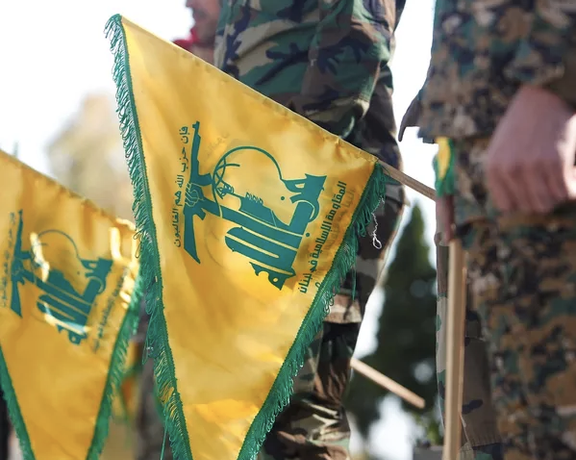
Lebanon's Iran-backed group Hezbollah is using all its propaganda tools to show support for the Islamic Republic and misrepresent the current nationwide protests in Iran.
Trying to show the realities in Iran differently and discredit the protests, Hezbollah organized rallies in support of the regime in Tehran with students from its private educational system – the Mahdi schools.
Lebanese activists have published videos of children from Al-Mahdi schools carrying photos of Supreme Leader Ali Khamenei and Qasem Soleimani, the slain commander of Quds force, the extraterritorial wing of Iran’s Revolutionary Guard.
Hezbollah held ceremonies at the schools in which children were used to show "obedience to religious authority" and “condemning the Western conspiracy” against the Islamic Republic and its "achievements," the Lebanese website al-Modon reported.
Mahdi schools are a cornerstone of Hezbollah’s “Society of Resistance,” featuring a standard modern technology-heavy curriculum mixed with its Islamic doctrine.
Iran has been engulfed in widespread antigovernment protests since September 19, after Mahsa Amini, a 22-year-old woman was killed in the custody of hijab police.
Oslo-based organization Iran Human Rights said on Saturday that at least 185 people have been killed in the uprising ignited by the death in custody of 22-year-old Mahsa Amini. The NGO added that about 20 of the killed were minors.
The protests first erupted in Mahsa Amini’s hometown Saqqez and capital Tehran and soon spread to all over the country and garnered support from Iranian expatriate communities around the world as well as foreign governments and officials.
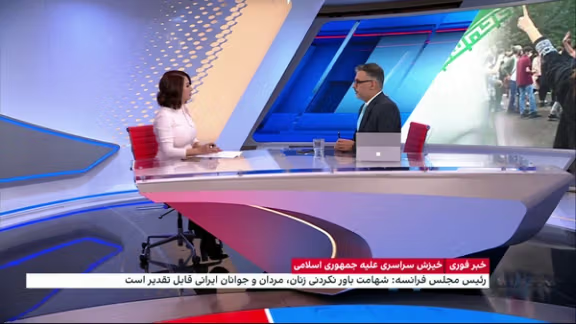
A senior Iranian lawmaker has asked the government to pursue legal complaints against Iran International TV for its coverage of protests that “invited riots.”
Mohammad-Taghi Naghdali (Naqdali) the secretary of Islamic Republic parliament’s legal and judicial committee, and a hardliner cleric, called on the government and the foreign ministry, October 8, to “use capabilities in the international arena” to take steps against Iran International and similar networks that “make calls for riots, destruction of property and regime change.”
Tens of millions of Iranians rely on social media and satellite TV channels to receive news and information that Iranian government-controlled media deny them. Iran International, BBC Persian, Manoto TV and US financed media beam programs to Iran that provide news, which is censored in local media by the government and its intelligence organs.
As protests began in Iran in mid-September, authorities severely restricted Internet and social media access, leaving the population to rely more on foreign-based television stations for news and information.
The Iranian government has tightly controlled media for over four decades, shutting down hundreds of newspapers and has jailing around 860 journalists over the years.
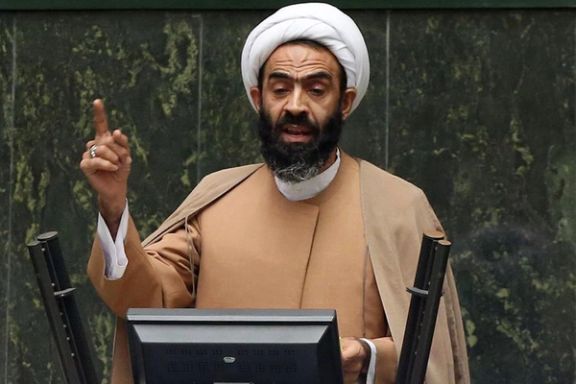
The Iranian government has been putting pressure on foreign-based Persian speaking media organizations for over a decade. First, websites of Radio Farda, BBC Persian and Voice of America were blocked in early 2003, before Iran International was established. Both radio and TV signals have been jammed and any contact with these media outlets have been punishable by lengthy prison terms.
In 2020, the Iranian judiciary announced confiscation of the properties of those journalists who had left the country and were working for Iran International.
In 2019, Iran’s ambassador in the United Kingdom had lodged a complaint to the British media watchdog Ofcom against the network which is based in London.
In March 2019, Ofcom dismissed the complaint, which related to a specific interview, saying that the network adhered to its guidelines.
At the time, Iran International representatives told the Guardian that the channel “provides fair, balanced and impartial coverage, and abides by its published Editorial Guidelines”, adding that it “covers the widest range of opinions of interest to all Iranians and Farsi speakers”.
However, Tehran continued its attacks against Iran International. In a statement released in November 2019, Iran's Intelligence Ministry said working for the network was "proof of collaboration in terrorist actions with the enemies of Iran" and claimed that it has arrested a number of individuals on charges of sending information to Iran International.
In his attack on the network, the Iranian lawmaker Naghdali specifically mentioned Ofcom, asking the government to take advantage of the watchdog’s existence, which he said “can be used by the foreign ministry and the Judiciary” to go after Iran International.
Iran International dismissed the claims of Mohammad-Taghi Naghdali on Sunday, saying that it adheres to OFCOM broadcasting guidelines. The network said its news coverage provides a platform to Iranian commentators, human rights defenders and civic activists to discuss vital social and political issues.
“Sadly, freedom of the press is denied to Iranian citizens in Iran. They are denied their voice by the Iranian government’s tightly controlled media,” the network's General Manager Mahmood Enayat said.

While outraging United States President Joe Biden, the Opec+ decision to cut oil production by 2 million barrels a day has mixed implications for Iran.
Market analyst Oilprice.com wrote Friday in its ‘Oil and Energy Insider’ bulletin that the decision had “placed the Biden Administration between a rock and a hard place, with oil prices climbing ahead of the mid-terms [November 8 US Congressional elections] and very few viable options to counter it.”
Biden’s press secretary Karine Jean-Pierre accused Opec+ of “aligning with Russia.” Biden himself said Wednesday the government would release an additional 10 million barrels in November from US strategic reserves, although the Strategic Petroleum Reserve (SPR) is already at its lowest level, 416 million barrels, since 1984.
The Wall Street Journal piled on criticism with an editorial Wednesday citing earlier lobbying efforts by senior Biden officials to dissuade the Saudis from production cuts. The Journal noted that the prospect of higher gasoline prices before the November 8 Congressional election had “sent the White House into overdrive.” The paper concluded that the Saudis “don’t seem to think risking relations with the US is all that big a deal” and had put “friendly relations with Russia above their ‘reputation’ in the US.”
Biden’s Democrats had been more optimistic, especially as oil prices eased in the summer, over their prospects for the November elections. But even before the Opec+ decision, there were encouraging signs for Republicans, including so-called “election deniers” close to Donald Trump sharing the former president’s unsubstantiated claims that the 2020 presidential election was rigged.
A shift away from the Democrats would likely increase voices in Congress critical of Biden’s efforts to revive the 2015 Iran nuclear deal, the JCPOA (Joint Comprehensive Plan of Action). At the same time, reviving the deal, and lifting US ‘maximum pressure’ sanctions targeting Tehran’s crude exports, would bear down on oil prices with perhaps an extra 1.5 million barrels a day (b/d) of Iranian oil reaching world markets.
$100 a barrel?
In the meantime, more expensive oil boosts Iranian revenues, albeit on the lower prices Tehran receives from sales of around 750,000-900,000 b/d, mainly to China exported in the face of tightening US sanctions.
In Tehran, Arman newspaper Saturday played down expectations of higher prices, although its headline noted that Opec+ aimed at an oil price of $100 a barrel. The $100 level is built into the Saudi strategic plan, Vision 2030. With the benchmark Brent crude at around $98 a barrel Friday, analysts are unsure how upward price pressure from lower production will balance downward pressure of recession fears.
Biden’s July trip to Israel and Saudi Arabia was widely portrayed as creating a new security alliance directed largely at Iran and extending the ‘normalization agreements’ made with Israel by the United Arab Emirates and Bahrain. But both Saudi Arabia and Israel have refused to follow the US line over Russia, with Riyadh coordinating with Moscow over oil production and the Israelis refusing to supply Ukraine with weapons given their own good relations with Moscow.
Washington broadsheet opinion
The Wall Street Journal, although a staunch supporter of close US ties with the Saudis and critical of the JCPOA, mocked Biden in its Wednesday editorial. “Mr Biden called Saudi Arabia a ‘pariah’ during the 2020 campaign, delayed a planned arms shipment, and continues to pursue a nuclear deal with Iran that would give the Saudis’ main enemy hundreds of billions of dollars to promote terrorism and other trouble. The President had to go hat in hand to the Saudi Crown Prince in July to ask for more oil production, and all he got was a lousy fist bump.”
The Washington Post piled in Friday, with an editorial arguing Biden was “begging foreign dictators to increase production” not only with the Saudis but by “preparing to lift sanctions on Venezuela’s narco-socialist dictatorship.” The Post said the US 264 billion barrels of untapped oil should be “unleashed” by ending Biden’s “war on fossil fuels at home.” Over half these US reserves require fracking, which is banned in much of Europe due to its heavy contribution to global warming, use of toxic chemicals, and seismic unpredictability.
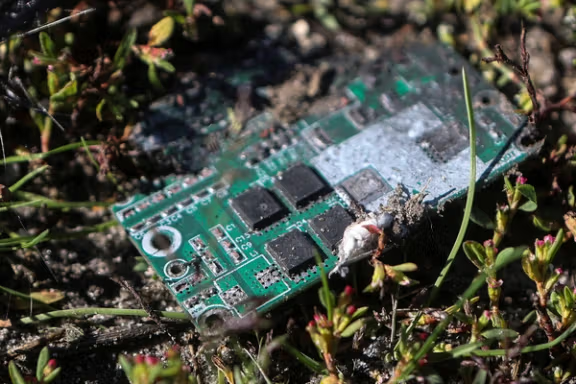
The Ukrainian military claimed Saturday that Russia has sent Iranian military drones to Belarus for possible attacks in western or central parts of Ukraine.
According to Kyiv Independent, Ukraine’s Territorial Defense Forces “West” reported that at least 20 Iranian Shahed-136 loitering drones were delivered to the Luninets airfield in Belarus, located around 50 kilometers from Ukraine.
Russia has stepped up attacks by Iranian drones to the interior regions of Ukraine in the past week. Shahed-136 drones are ‘suicide’ unmanned aerial vehicles that are relatively hard to spot and shoot down, although Ukrainian forces have had some success in targeting them in the air.
Some Ukrainian bloggers covering the war expressed concern that the Iranian drones can be used to target Western arms supplies to Ukraine that use land corridors in the west of the country to bring in weapons and supplies.
Iran, a close ally of Russia is under US sanctions for its nuclear program and talks since April 2021 to resolve the issue have failed.
The United States warned in July that Russia was planning to obtain Iranian drones, with its own UAV force not fully capable of performing its war missions.
Several Iranian drones launched from Russian-held territory in Ukraine’s south attacked targets 75km south of Kyev this week. Although some were shot down, the Ukrainian military reported six explosions at a military base in Bila Tserkva.
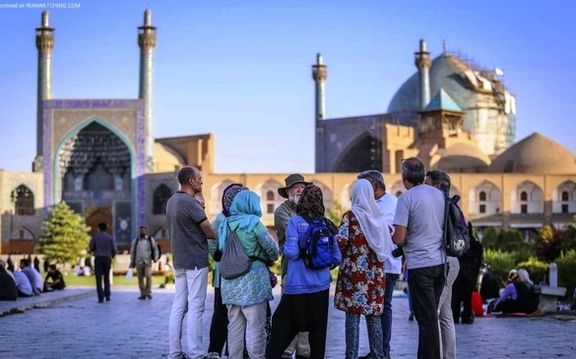
The French Foreign Ministry has urged all its nationals to "leave Iran as soon as possible given the risk of arbitrary detention to which they are exposed."
"Any French visitor, including dual nationals, is exposed to a high risk of arrest, arbitrary detention and unfair trial," read a Friday statement by Paris.
Earlier Thursday, Paris condemned Tehran for airing a video of a French couple, who say they are spies of the French intelligence service.
In order to build a narrative of foreign engendered protests, Iranian state media on Thursday released a trailer of an apparently longer program featuring forced confessions of Cécile Kohler, an educator who heads the teachers’ union National Federation of Education, Culture and Vocational Training (FNEC FP-FO) and her husband Jacque Paris.
In the short clip, they say they are agents of the French intelligence service, and were sent to Iran to prepare grounds for riots. State TV said the two French citizens had entered Iran with "chunks of money ... which was meant to fund strikes and demonstrations." "Our goal at the French security service is to pressure the government of Iran," said Paris in the video.
Moreover, the Dutch government on Friday urged all Dutch nationals to leave Iran and advised against all travel to the country, Dutch news agency ANP quoted Foreign Minister Wopke Hoekstra as saying.